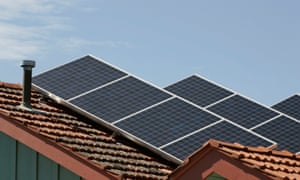Extract from The Guardian
Australia could become a world leader in home battery storage, with
the potential for energy stored from solar panels offering the cheapest
electricity alternative within just three years, according to a new
report.
The study, by the Climate Council, predicted that the cost of battery storage would fall “dramatically” and help Australian homeowners overcome the intermittency of electricity generation from rooftop solar panels.
On the basis of a $10,000 battery system with a payback of 10 years, the Climate Council predicts that half of all Australian households will adopt battery storage for their solar systems, with capacity growing 50-fold and the market’s value ballooning to $24bn.
The report states that by 2018 the trend could reduce costs of energy as such that getting off-grid will become cost-competitive to staying connected.
Leading manufacturers of home-based battery systems are targeting Australia, where 1.4m households have rooftop solar panels.
The US firm Tesla has announced that its vaunted 7 kWh Powerwall system will be available in Australia by the end of the year – one of the first overseas markets to get the product. The Canberra-based business Reposit Power, which enables people to directly buy and sell their stored electricity, partnered with Tesla for Powerwall’s launch.
Other market players have emerged too, with Enphase Energy rolling out its home energy solution in Australia and New Zealand next year. The system combines solar generation, energy control and storage.
Amanda McKenzie, the chief executive of the Climate Council, said this competition meant prices would fall and would prove a “game changer” in how Australians used electricity. “Australians are forging a people-led renewables revolution,” she said.
“Australia leads the world in rooftop solar with more than twice the solar PV penetration rates of the next country – Belgium – and more than three times the penetration of Germany, the US and the UK.”
According to the Climate Council, households that don’t use stored energy could make the biggest savings. They would be able to keep and use this power rather than purchase electricity during expensive peak demand periods, the not-for-profit said.
The advancement of battery storage has led to shifts in policy direction from both traditional energy companies and the government.
AGL Energy, which has significant brown coal interests in Victoria, is developing its own battery while the Coalition, which has previously attempted to abolish the Clean Energy Finance Corporation, has can cited battery storage as an area the agency help develop.
The study, by the Climate Council, predicted that the cost of battery storage would fall “dramatically” and help Australian homeowners overcome the intermittency of electricity generation from rooftop solar panels.
On the basis of a $10,000 battery system with a payback of 10 years, the Climate Council predicts that half of all Australian households will adopt battery storage for their solar systems, with capacity growing 50-fold and the market’s value ballooning to $24bn.
The report states that by 2018 the trend could reduce costs of energy as such that getting off-grid will become cost-competitive to staying connected.
Leading manufacturers of home-based battery systems are targeting Australia, where 1.4m households have rooftop solar panels.
The US firm Tesla has announced that its vaunted 7 kWh Powerwall system will be available in Australia by the end of the year – one of the first overseas markets to get the product. The Canberra-based business Reposit Power, which enables people to directly buy and sell their stored electricity, partnered with Tesla for Powerwall’s launch.
Other market players have emerged too, with Enphase Energy rolling out its home energy solution in Australia and New Zealand next year. The system combines solar generation, energy control and storage.
Amanda McKenzie, the chief executive of the Climate Council, said this competition meant prices would fall and would prove a “game changer” in how Australians used electricity. “Australians are forging a people-led renewables revolution,” she said.
“Australia leads the world in rooftop solar with more than twice the solar PV penetration rates of the next country – Belgium – and more than three times the penetration of Germany, the US and the UK.”
According to the Climate Council, households that don’t use stored energy could make the biggest savings. They would be able to keep and use this power rather than purchase electricity during expensive peak demand periods, the not-for-profit said.
The advancement of battery storage has led to shifts in policy direction from both traditional energy companies and the government.
AGL Energy, which has significant brown coal interests in Victoria, is developing its own battery while the Coalition, which has previously attempted to abolish the Clean Energy Finance Corporation, has can cited battery storage as an area the agency help develop.

No comments:
Post a Comment